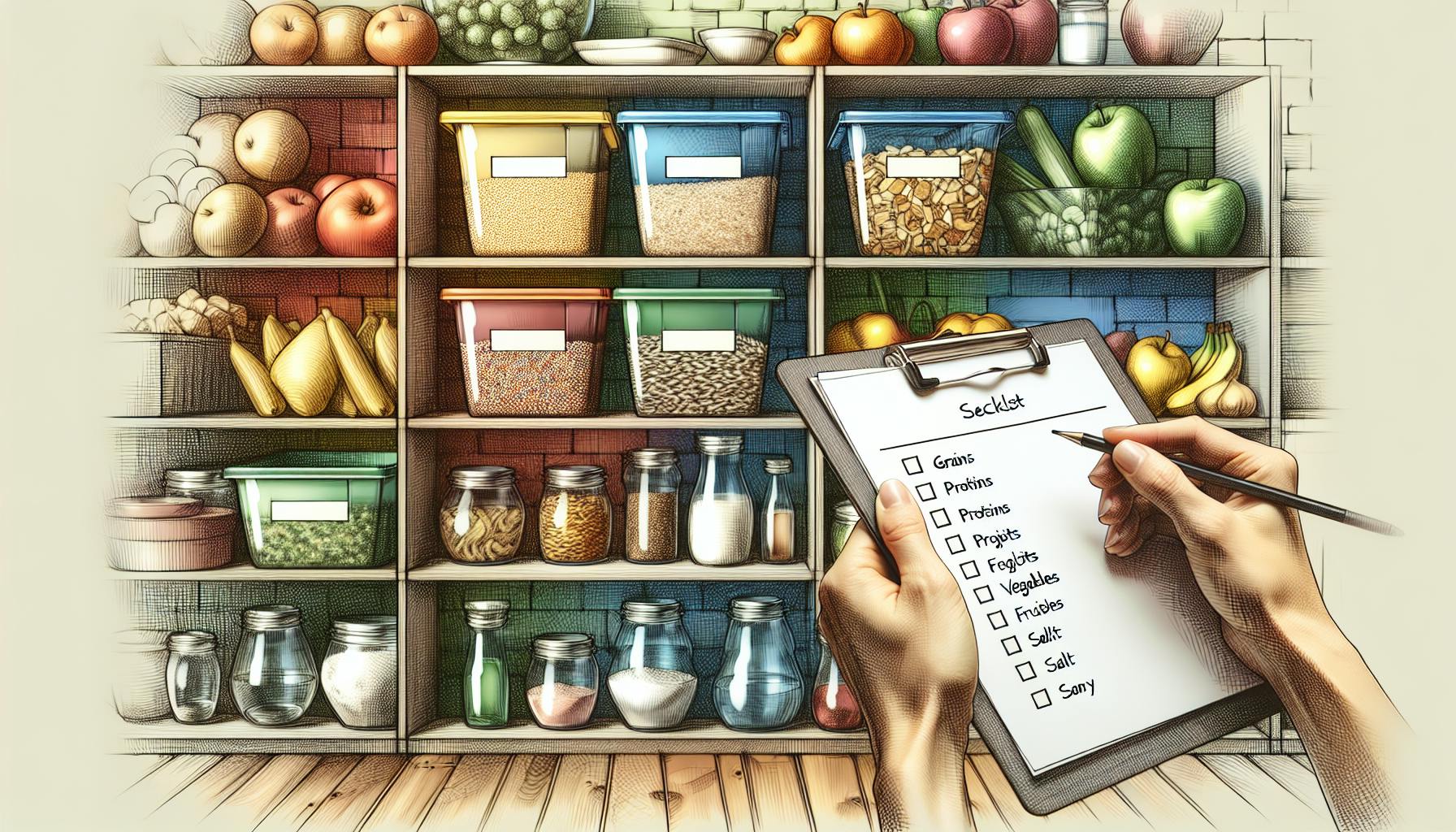Preppers would agree that having a stockpile of canned meats with long shelf lives is essential for emergency preparedness.
This guide explores the canned meats that offer the longest shelf lives - allowing you to keep your pantry well-stocked for years to come.
You'll discover the best options for long-term canned meat storage, techniques to maximize shelf life through home canning, indicators to assess canned meat quality over time, and practical usage tips - equipping you with essential knowledge to build your survival stockpile.
Introduction to Canned Meats with the Longest Shelf Life
Canned meats with long shelf lives are an essential component of any prepper's pantry. Stockpiling these non-perishable protein sources ensures you have nutritious foods on hand in an emergency when fresh meat may be unavailable.
The key benefit of canned meats is their exceptional shelf life of 5-10 years or more when stored properly. This longevity allows you to buy in bulk when prices are low without worrying about spoilage. Canned meats are also convenient, portable sources of protein should you need to evacuate quickly.
When looking for the longest-lasting canned meats, opt for simple choices like chicken, tuna, salmon, beef, pork, and Vienna sausages. Avoid more perishable options like spam or stew meats with vegetables. Proper storage in a cool, dark place further preserves quality and shelf life.
Understanding the Longest Shelf Life Foods
Foods with extended shelf lives retain their safety, nutritional value, texture, and taste for years in an unopened can. Commercially canned meats undergo pressure canning and typically have a shelf life of at least 5 years from the packaging date. Some products may last 10+ years if the can remains intact and undamaged.
Over time, the quality may gradually decline but canned meat remains safe to eat as long as the can has no rust, bulges, or leaks. Discoloration of the contents is common as the meat ages but does not indicate spoilage on its own.
The Role of Canned Meat in a Prepper Pantry
Canned meats are prepper pantry essentials because they check all the boxes: long shelf life, affordability, portability, and nutrition. Stock up on canned chicken, tuna, beef, and other meats when they go on sale to build reserves.
If fresh meat becomes unavailable during an emergency, you’ll still have proteins to make nutritious meals. Canned meats also require no refrigeration and can be eaten cold if needed. They take up little space compared to other foods yet provide essential nutrition from protein, healthy fats, vitamins, and minerals.
Rotate your stock as you use canned meats in everyday cooking. First in, first out helps ensure nothing expires before you get to enjoy it.
Best Practices for Storing Canned Food with Longest Shelf Life
To maximize canned meat shelf life, store at 50-70°F in a dark, dry area like a basement or interior closet. Avoid placing cans in hot garages, near appliances generating heat, or in direct sunlight. The cooler the storage temperature the better.
Check cans every 6-12 months for any bulges, rust, or leaks and discard any compromised containers. Wipe the exterior of cans periodically to remove dust and debris. Ensure older stock gets used first by rotating inventory.
With proper storage, most commercially canned meats remain edible and nutritious for over a decade, giving preppers long-term food security. Stock up on meats with the power to outlast disasters both big and small.
What canned meats are good for long-term storage?
Canned meats can provide an excellent source of protein with a long shelf life, making them ideal for long-term food storage. Here are some of the best options to consider stocking up on:
Canned Beef
Canned corned beef and canned beef stew are very shelf-stable and can last 2-5 years when properly stored. Opt for cans with meat packed in broth rather than oil for maximum freshness over time.
Canned Chicken
Canned chicken breast, canned chicken meat, and canned chicken spreads like chicken salad have a shelf life of 2-5 years. Canned chicken is versatile to use in casseroles, sandwiches, salads and more.
Canned Fish
Tuna, salmon, sardines, mackerel, and other canned fish typically keep for 3-5 years when stored properly. Canned fish provides healthy fats and proteins. Stock up on cans packed in water or broth rather than oil.
Canned Pork
Spam, canned ham, and canned bacon can have shelf lives exceeding 5 years. While the texture may soften over time, the preserved meat will remain safe to eat.
No matter what canned meats you choose, be sure to store them in a cool, dark place to maximize freshness and shelf life. Rotate stock as you use it to avoid waste. With the right storage methods, canned meat can provide years of protein to a survival pantry.
Can you eat 20 year old canned meat?
Canned meat can generally be safely consumed years after the expiration date, as long as the can itself is still in good condition. However, here are a few key things to consider regarding 20 year old canned meat:
Check for signs of spoilage
- Carefully inspect the can for bulges, rust, or dents. Any of these could indicate the seal has been compromised and bacteria or other contaminants may have entered.
- When you open the can, check that the contents look normal with no off smells or colors. Discard anything that seems spoiled.
Understand nutritional value and taste may decline
- While still technically safe to eat, vitamins like C and B decrease over time in canned goods. The meat may also start to taste bland or take on a metallic flavor.
Take extra precaution with meat and seafood
- Low-acid foods like meat and seafood have more potential for harboring botulism bacteria, especially if cans are dented or damaged. Thoroughly cook contents to 165°F.
So in summary, 20 year old canned meat can likely still be safely consumed if carefully inspected and cooked thoroughly, but the quality and nutritional value may have diminished compared to fresh or more recently packaged goods. When in doubt, remember "if canned - then cooked" to kill any possible bacteria.
What canned food has the longest shelf life?
When it comes to stocking your prepper pantry, canned meats with the longest shelf life are essential. As a general rule, low acid canned foods like meat and vegetables can last 2-5 years when properly stored. However, to maximize shelf life there are some specific types of canned meat that stand out above the rest.
Canned Ham
Canned ham is processed and contains preservatives that allow it to keep for 5 years or more. Opt for cured hams packed in water rather than syrup, which can cause the meat to spoil faster. Vacuum sealed cans also help block oxygen and prevent rust. Canned ham makes a tasty addition to meals when SHTF.
Canned Tuna
High quality canned tuna fish sealed in water can have a shelf life up to 5 years past its printed expiration date. Tuna is packed with protein and nutrients, providing sustenance when fresh meat is hard to come by. Stock up on tuna for your prepper pantry.
Canned Chicken
Much like tuna, commercially packaged canned chicken can keep 2-5 years when properly stored in a cool, dark place. Chicken is a lean source of protein that can be eaten on its own, added to rice or pasta, or used in hearty stews and chilis. It's an ideal canned meat for preppers.
When buying canned meat focus on quality, vacuum sealed products with longer shelf lives. Properly stored, these essential canned meats will provide protein to feed your family when SHTF.
What is the best canned food to stockpile?
When it comes to stockpiling canned foods with a long shelf life, there are a few essential categories every prepper should focus on.
Canned Meats and Seafood
Canned meats like spam, corned beef, canned chicken, and canned tuna generally have shelf lives of 2-5 years. Canned seafood like sardines can last 3-5 years as well. These canned protein sources are nutritious and filling additions to your stockpile. Consider buying pop-top cans for easy opening.
Canned Fruits and Vegetables
Most commercially canned fruits and vegetables last 2-3 years, though home canning extends shelf life. Favorites like canned beans, tomatoes, carrots, peaches, and pineapple will provide key nutrients when fresh options aren't available. Buy various fruits and veggies to add diversity.
Canned Dairy
While fresh dairy doesn't store well long-term, some canned milk options like condensed and evaporated milk can last 2-3 years. Powdered milk lasts even longer at 10 years when properly stored. These help satisfy nutritional needs for calcium, vitamin D and protein.
When building your canned food stockpile, focus on nutrient-dense and versatile options that align with your tastes and planned meals. Calculate quantities based on realistic consumption rates. Routinely check and rotate inventory to maximize shelf life. Proper storage conditions are also key - keep cans in cool, dark, and dry places.
sbb-itb-b932644
Best Canned Meat with Longest Shelf Life Selections
Canned meats can have exceptionally long shelf lives, making them staple items for preppers stocking up their pantries. When properly stored, certain canned meats can last 3-5 years or longer before spoiling.
Canned Beef: A Long-Lasting Staple
Canned beef like corned beef often has a shelf life of 2-5 years when commercially packaged. The canning process cooks the beef, killing bacteria that leads to spoilage. As long as the can remains undamaged and securely sealed, canned beef stays fresh for years in cool, dark storage. Its hearty flavor and texture also make it a go-to for stews, sandwiches, and more - perfect for the survivalist stockpile.
Canned Tuna: A Prepping Essential with Extended Freshness
Commercially canned tuna typically retains its safety and nutritional value for 3-5 years unopened. Special canning methods help block oxygen and bacteria that speed up food spoilage. Properly stored canned tuna maintains a pleasant flavor and texture for years. Tuna's versatility as a protein source makes it a long shelf life essential for preppers.
Canned Chicken: Reliable Poultry with Longevity
While not as long-lasting as beef or tuna, commercially canned chicken still keeps for 1-2 years when stored correctly. Its affordability, nutrition, and versatility also make it a smart addition to the survival pantry. Opt for chicken packed in water over oil or broth for maximum shelf life.
Canned Seafood: Diverse Options with Varying Shelf Lives
From canned salmon to sardines and mackerel, commercially packaged seafood offers prepper pantries variety. Shelf lives range widely depending on exact type. Salmon may last 2-3 years, while sardines and mackerel often keep 4-5 years when unopened. Such diversity ensures long-term access to critical omega-3s.
Maximizing Home Canned Meat Shelf Life
Selecting and Preparing Meats for Home Canning
When selecting meats for home canning, opt for lean cuts that are fresh and have no signs of spoilage. Trim off excess fat, which can turn rancid over time. Thoroughly clean tools and work surfaces to prevent contamination. Prepare meats in bite-sized pieces or thinly sliced to ensure thorough heating during canning.
Home Canning Techniques for Long-Term Storage
Proper home canning technique is crucial for safely preserving meats. Use a pressure canner and follow validated recipes. Sterilize jars, lids and equipment. Heat raw packed jars to 240-250°F for poultry and meat, or 212°F for fish. Allow sealed jars to cool undisturbed for 12-24 hours. Test seals, then store in a cool, dark place.
Monitoring Home Canned Meat Shelf Life
Home canned meats stored properly in sterilized, vacuum-sealed jars can safely last 2-5 years. Inspect jars regularly for broken seals, rust, bulging lids or foul odors. Ensure meats remain fully submerged in liquid with no exposure to air. Reheat home canned meat products thoroughly to 165°F before consuming. Practice "first-in, first-out" organization and labeling of jars to optimize canned meat shelf life.
Assessing Canned Meat Shelf Life and Quality
Properly stored canned meats can have an exceptionally long shelf life, but there are important signs to look for when checking if your canned meat is still safe to eat.
Visual and Sensory Indicators of Canned Meat Spoilage
- Examine the can for damage like bulges, leaks, punctures, cracks, or severe dents along the seams. Do not consume meat from compromised cans.
- Check the meat color through the can. Significant darkening or unnatural hues may indicate spoilage.
- Upon opening, look for an unnatural color or sheen. Gray, green, or black discoloration is unsafe.
- Sniff the contents immediately. Rancid, sour, or unpleasant odors signify spoilage organisms.
Understanding Textural Changes in Aged Canned Meats
As canned meats age past their prime, the moisture content declines and the texture suffers. Signs of diminished freshness include:
- Sponginess from moisture loss
- Sliminess from bacteria growth
- Hardness as oils solidify and dry out
Press a fork down into opened canned meat. If the tines leave lasting indentations, the firmness has intensified undesirably.
Safety Checks Before Consuming Long-Stored Canned Meats
Canned meat stored for over 2 years should be evaluated cautiously before eating:
- Carefully inspect for any swelling or damage. Do not consume from bulging, dented, or leaking cans.
- Open carefully, staying clear of any gas release. Fizzing or spurting may reflect organism growth.
- Check the color and scent for spoilage indicators. Rancid or green meat is unsafe.
- Test a small portion. Any bitterness, soft textures, or lingering aftertaste means don't eat.
When assessing aged canned meats, err on the side of caution. If in doubt, throw it out. With careful storage methods, freshly canned canned meat with longest shelf life options offer lasting nutrition for your stockpile.
Practical Tips for Consuming and Cooking Aged Canned Meat
Taste-Testing Aged Canned Meat Safely
When taste-testing canned meats that are nearing or past their expiration date, it's important to do so safely to avoid any foodborne illnesses. Here are some tips:
-
Open the can and examine the contents carefully. Look for any bubbling, fizzing, mold, sliminess, or foul odors which are signs of spoilage. If detected, discard the canned meat.
-
Use a clean utensil to transfer a small portion, about 1-2 bites worth, onto a clean plate. Do not eat directly from the can.
-
With the remaining canned meat sealed, allow the sample bite to sit at room temperature for 10-15 minutes. Observe if any odors develop or if mold appears which would indicate spoilage.
-
If the taste-test portion still appears and smells normal after sitting out, it should be safe to taste. Use caution and listen to your senses. If anything seems off while eating, spit it out immediately.
Proceeding with consuming the full can if the taste-test shows no signs of spoilage. Still, canned meats past their prime may have some loss of texture or flavor.
Cooking Techniques to Revitalize Older Canned Meat
Heating aged canned meat to a safe internal temperature helps make it more palatable and destroys any potential foodborne illnesses. Here are some cooking tips:
-
If the meat seems very soft or mushy, opt for dishes where it will be heated thoroughly like chilis, casseroles or stews.
-
Fry the meat in a skillet or sauté with spices and veggies to give it more texture. Getting some caramelization can enhance the flavor.
-
For canned meat that is still relatively firm, grilling or pan frying into dishes like tacos, sandwiches, omelets or pizza toppings can make it more appetizing.
Always use a food thermometer to confirm canned meats reach an internal temperature of 165°F. This kills any Listeria, Salmonella or other pathogens that could be present.
Discarding Compromised Canned Meat: Health Comes First
Consuming spoiled, severely aged canned meat is never worth the risk of serious foodborne illness. Even if a taste-test shows no obvious signs of spoilage, meat past its expiration date may harbor dangerous microbial growth.
When in doubt, remember this simple phrase - "When canned meat goes bad, toss it out and don't feel sad". There are always more options out there for well-preserved proteins and meals.
Do not let the waste of compromised meat justify putting yourself in harm’s way. Be vigilant and keep the safety of your family, especially vulnerable groups like children and elderly, as the top priority.
Conclusion: Ensuring a Well-Stocked Pantry with Longest Shelf Life Food
A well-stocked pantry with canned goods that have long shelf lives is an essential part of emergency preparedness. By selecting commercially canned meats with inherently longer shelf lives, like canned meat with longest shelf life options such as ham or tuna, and through careful home canning techniques, preppers can build up a survivalist stockpile that will remain safe and nutritious for years to come. Staying vigilant with regular checks for any signs of spoilage is also key. With some thoughtful planning and diligent monitoring, it's possible to keep a canned meat supply with shelf lives measured in decades rather than months.
Recap: Selecting Canned Meats for Your Survivalist Stockpile
When stocking up on canned meats for your prepper pantry, prioritize options known to have longer shelf lives, such as:
- Canned ham or spam (2-5 years shelf life)
- Canned tuna or salmon (2-5 years shelf life)
- Other canned fish like sardines or mackerel (2-5 years shelf life)
Canned beef, chicken, or pork generally have shorter shelf lives around 1-2 years.
Home Canning Mastery: A Prepping Essential
Properly home canned meats using pressure canners can have shelf lives of 3-5 years or longer if stored correctly. Mastering safe home canning techniques is a valuable skill for preppers looking to expand their long-term food reserves.
Staying Vigilant: Regular Checks on Canned Meat Quality
Check canned meats regularly for any signs of spoilage like rust, leaking, swelling, or spurting liquid. Discard immediately if detected. Track storage durations. With vigilance, commercially or home canned meats can safely last for years.


